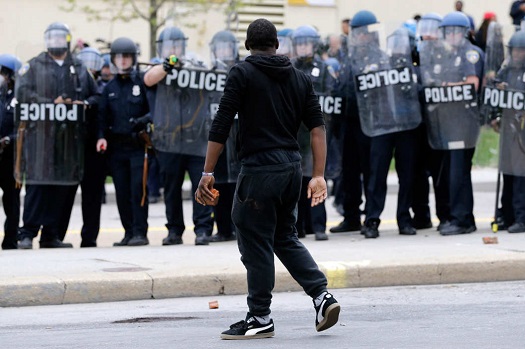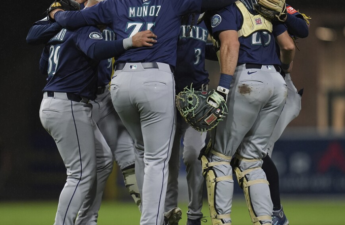
It was trendy there for a few weeks of Internet time to write snide little stories on how American news events would be reported on by American news if they weren’t American news events at all. How would Ferguson look to the American media if Ferguson were taking place in Iran? People would giggle. But I’m not sure we’ve taken it sufficiently to heart. I’m not sure we’ve realized how deeply profound this exercise is. Because the bias, your bias, is on the side of law and order of the authorities in the United States. Deep down, you believe, at least a little bit, that these authorities and their enforcement arms derive fundamentally from the consent of the governed and the consistency of the Constitution while, deep down, every other place’s order derives from something at least a little bit fishy or corrupt or questionable.
Sure, I shouldn’t say everyone. There’s a few of you out there, perhaps public defenders or those who have run directly afoul of our judicial system, maybe of our police force in one city or another, who might be so skeptical of our own hierarchy for maintaining order that you trust most other systems and peoples more. But by and large, it’s very difficult to grow up in this nation without assuming that the order of things here is to keep everyone safe and happy, while the order of everywhere else is at least a little bit selfish or misguided.
This is crazy thinking, people. Myopia of the first order.
Even if you believe, deeply and truly, in the American experiment in its best form, the notion that it is an unending train of progress and success is facially ludicrous. This nation codified slavery, genocide, and discrimination of nearly every kind imaginable. This history is not over, with the right of same-sex couples to marry still being a hotly debated question rather than an obvious no-afterthoughts protection. And then there is the right of people to be safe and protected by their government, rather than prejudicially being labeled its enemy by virtue of the color of their skin. A right not to be profiled, not to be assumed to be dangerous regardless of one’s true intent or capability.
I am not here to condemn all police officers, nor to accuse every person in the country of being a racist. But if you don’t see something systemic about the way African-American men are treated in this society by so-called law enforcement entities, then you’re simply not paying attention. And the litmus test for that is if it were happening anywhere else. If Iran or China or Syria were rounding up one kind of people at that kind of rate and routinely slaughtering them unarmed and unthreatened, we would label it persecution of a minority group. We would call Baltimore a justified freedom-fighting movement. We would likely label efforts to retribute against such a movement the first steps toward ethnic cleansing.
I am a pacifist. I abhor violence of all kinds and shapes by all sides. I, frankly, don’t believe in freedom-fighting movements when fighting is the operative word. So I’m not here to justify the exceptional violent actions of the few in Baltimore. But I do think it’s vital to contextualize the reality of a group forced to live in fear, continually watching innocent men turned to martyrs while the mainstream establishment refuses to pay attention. The reason that Black Lives Matter became a slogan is that it really seems to so many that they don’t. For agency after agency after agency to approach the killing of Black men like an administrative hiccup to be explained, obfuscated, and shuffled away without fear of censure or even oversight from higher governmental authorities is to tacitly endorse, as a system, the indifference that enables these killings to become so commonplace. It is somewhat unsurprising that a nation that refused to launch even a cursory investigation into the financial instruments that nearly triggered a global economic collapse also stands uninterested in auditing its racial practices in terms of law enforcement. But admitting you have a problem is the first step. Flatly standing behind denial just makes you look laughable in any objective view.
Unfortunately, America is the land of the unobjective view. Look, we all like the home team. We all root irrationally for the team that’s nearby, whose players are familiar and relatable and that one grew up just down the street from me! It’s human nature to be a bit provincial. But you don’t hear Norwegians capping every campaign stump speech passionately evoking the God-given fact that Norway is the greatest country that was, is, and will be. That kind of commitment to self-aggrandizement was a hallmark of the monarchies this American idea was intended to replace, replete with all the ego and greed that monarchies bred. How can we read about severed spinal columns that go “unexplained”, about yet another plastic water gun or set of keys mistaken for a firearm, and continue to stand by this notion that we are infinitely better than any other country, any other system, any other people trying to improve the way things work in their society?
If you love America, you love its changes. You love its desire to improve itself. The people rising up in Baltimore are trying to remind you that this country has only become better though resistance, through the people who are willing to defy authority to expose its injustices. Movies like “Selma” remind us that our current heroes were branded as unpopular troublemakers only a generation ago. And while it’s sad to admit that the very same struggle back then is still a major obstacle to progress now, believing anything else is to fold up two very large American flags and stuff them in your ears and take a third and drape it threefold before your eyes. This nation has been systemically oppressing the same people for centuries. It’s only going to stop if we admit that’s what’s going on, that’s what’s been going on, and we need more than cosmetic changes or the condemnation of a few case studies to truly fix it.
This country was founded on the principle of rising up against unjust authority for what you believe. The cause was vastly less justified than the cause of oppressed African Americans at any point in our history – it mostly amounted to whining about taxes. To fail to embrace the legitimacy of this cause is un-American. Far more un-American than believing that this country is still a work in progress, still has a long way to go, and still may never be the best country of all-time.


